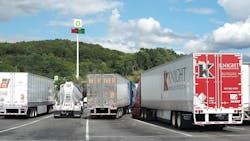Study lays out high cost of limited, safe truck parking
There is a high cost for not having enough safe places for commercial truck drivers to park and rest, according to a pilot study by Oregon State University.
Over a seven-year period on one 290-mile stretch of highway alone, at-fault truck crashes resulted in about $75 million of “crash harm,” research conducted by the OSU College of Engineering for the Oregon Department of Transportation shows.
“Current crash data collection forms don’t have an explicit section for truck-parking-related crashes, but we can operate under the assumption that specific types of at-fault truck crashes, such as those due to fatigue, may be the result of inadequate parking,” said Salvador Hernandez, a transportation safety and logistics researcher at Oregon State and the study's lead author.
Hernandez and graduate research assistant Jason Anderson analyzed Oregon’s portion of U.S. Highway 97, which runs the entire north-south distance of the state along the eastern slope of the Cascade Range.
Highway 97 was chosen, Hernandez said, because the idea for the study originated from ODOT’s office in Bend, which is near the highway’s Oregon midpoint. An impetus for the research was the 2012 passage of “Jason’s Law,” which prioritized federal funding to address a national shortage of truck parking.
Jason’s Law is named for truck driver Jason Rivenburg, who was robbed and fatally shot in South Carolina in 2009 after pulling off to rest at an abandoned gas station.
For “property-carrying drivers,” as opposed to bus operators, federal rules require drivers to get off the road after 11 hours and to park and rest for at least 10 hours before driving again.
“Around the country, commercial drivers are often unable to find safe and adequate parking to meet hours-of-service regulations,” Hernandez said.
Researchers found this true in Oregon, where rest areas and truck stops in high-use corridors have a demand for truck parking that exceeds capacity. Researchers looked at what other states were doing in response to the parking issue, surveyed more than 200 truck drivers, assessed current and future parking demand on Highway 97, and used historical crash data to identify trends and hot spots and to estimate crash harm.
“Crash trends in terms of time of day, day of the week, and month of the year follow the time periods drivers stated having trouble finding places to park,” Hernandez said. “In Oregon, if we do nothing to address the problem and freight-related traffic continues to grow, we’ll face greater truck parking shortages. A possible solution is finding ways to promote public-private partnerships, the state working together with industry.”
A solution is not, Hernandez said, simply waiting for the day autonomous vehicles take over the hauling of freight as some predict.
About the Author
Fleet Owner Staff
Our Editorial Team
Kevin Jones, Editorial Director, Commercial Vehicle Group
Cristina Commendatore, Executive Editor
Scott Achelpohl, Managing Editor
Josh Fisher, Senior Editor
Catharine Conway, Digital Editor
Eric Van Egeren, Art Director
